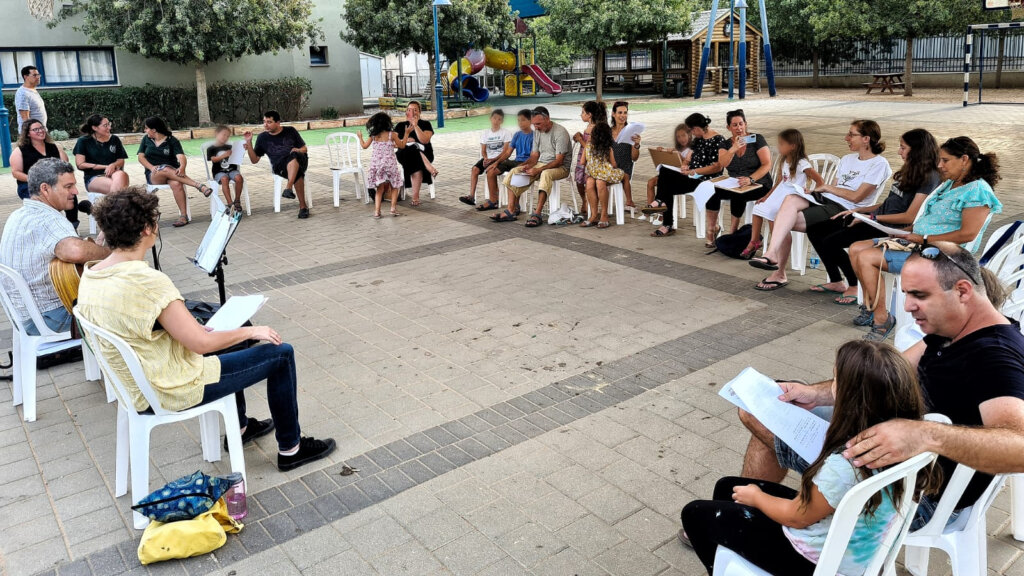Israeli city refuses to allow a synagogue for Reform congregation. We’re suing
In Israel, funds for synagogue construction are channeled almost exclusively to the ultra-Orthodox

Graphic by Angelie Zaslavsky
With the holiest days in the Jewish year approaching, synagogues are preparing to welcome their largest crowds of worshipers for the year all around the world. But in Israel some congregations face challenges most people would find impossible to believe in a Jewish state: They will not be able to pray in a proper synagogue.
One such case is that of the Reform congregation Yuval in Gedera, a small city about 25 miles south of Tel Aviv. Yuval was established 13 years ago by a group of native-born young Israeli families who were seeking a pluralistic religious experience. Most of the 30,000 residents of Gedera are either secular or Masorti (meaning Jews who are neither secular nor strictly observant but feel an affinity to Orthodox Judaism). Around 20% are Orthodox.
In Israel, there is no separation between religion and state and the state is heavily involved in funding religious services, including rabbis’ salaries and building synagogues. But the funds are channeled almost exclusively to Orthodox and ultra-Orthodox rabbis and their institutions and congregations. Reform and Conservative congregations are regularly shortchanged.
Since its establishment, the 120 members of the Yuval congregation have been praying in the hallway of a local school without heating or air conditioning, and without an ark for their Torah. In Israel, unlike in the U.S., the government allocates land for places of worship. In Gedara, all of the lands and budgets allocated to synagogues were given to 40 Orthodox synagogues, all of which operate in proper buildings. This means there is no real egalitarian alternative for Gedera residents who wish to celebrate their religion outside of Orthodoxy.
Land allocation for a synagogue requires a congregation to go through a long and often frustrating process by the local municipality, a political body that in most cities in Israel includes Orthodox representatives who almost always oppose the allocation of lands and budgets to non-Orthodox congregations. In these cases, we, at the Israel Religious Action Center — the legal and public advocacy arm of the Israeli Reform movement — must go to court and demand that the municipality grant us our rights.
The story of Gedera is unusual because of the intensity and longevity of the legal struggle, though it isn’t a singular case. We have submitted four petitions on behalf of the Yuval congregation against the municipality and the mayor in the last seven years.
Seven years ago, in our first court victory in Gedera, the judge wrote that even if the mayor of Gedera does not support the Reform congregation, the municipality must act in an equal manner.
The ruling stated that the mayor’s personal opinion could not justify the discrimination in allocating public resources to religious communities. Unfortunately, the mayor ignored the judicial mandate.
Two years ago, the district court judge ordered the municipality to find a plot of land for the Reform congregation. After the city offered three options, the congregation chose one of them and submitted an allocation request. But nothing happened. Again, we returned to court.
That’s when the mayor changed his mind, declaring that this plot — which the municipality itself had offered as one suitable for a Reform synagogue — was not suitable because the surrounding neighborhood is Orthodox, which is not true. The court ordered the municipality to proceed with the allocation process nevertheless.
We were notified last week that the municipality refused to allocate the land to the Yuval congregation and decided instead to allocate it to an ultra-Orthodox Youth movement. We are now preparing to go back to court for the fifth time.

The congregation still prays in the school’s hallway. That’s where they will be marking the holiest days in the Jewish calendar this year. Meanwhile, the municipality keeps allocating lands and budgets for additional Orthodox synagogues.
We have had many victories in other Israeli cities like Netanya and Modi’in, where we have changed the way local decision-makers think about the Reform congregation and made them understand — often through legal action – the need for equal allocation of public resources regardless of religious affiliation.
Reform Jews in Israel, the homeland of the Jewish people, are forced to fight a war of attrition simply to be able to pray as millions of Jews in the diaspora pray.
Carrying on such a Sisyphean struggle is not easy for a congregation that is heavily based on volunteers. Feeling that you and your needs are invisible in the eyes of the mayor is extremely difficult. But they, and we, are not giving up.
We will continue the struggle until the values of the Israeli Declaration of Independence, of equality and freedom of religion, become a reality for all Israelis.
To contact the author, email [email protected].















